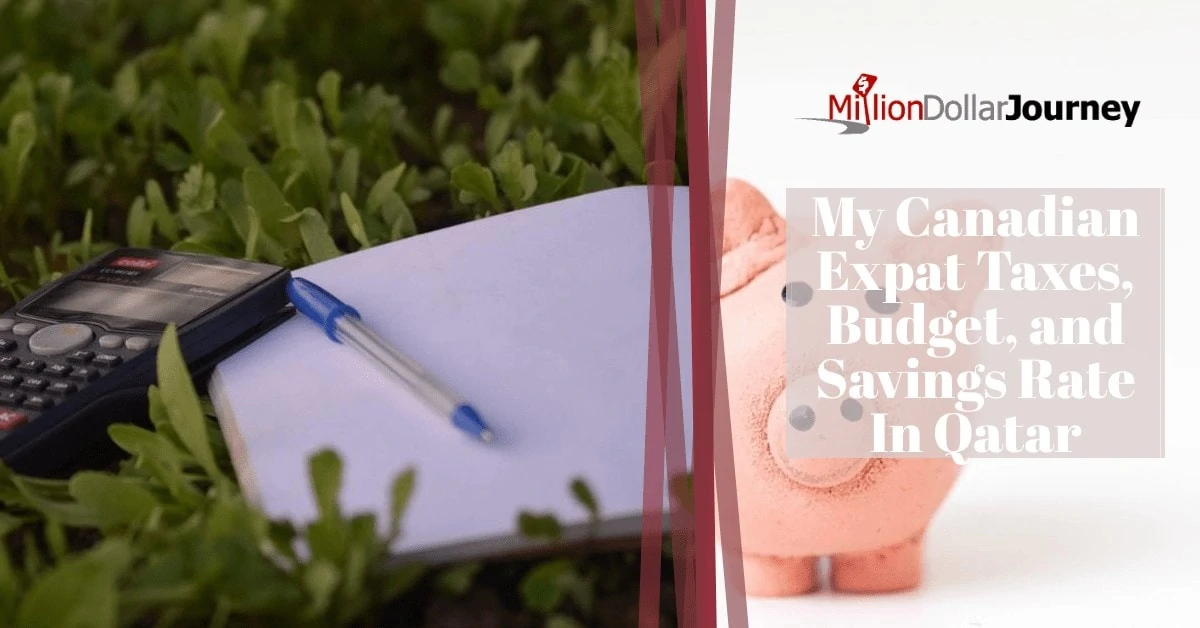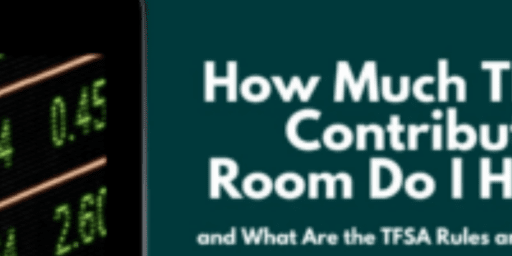My Canadian Expat Taxes, Budget, and Savings Rate In Qatar
Can I really go work in Qatar and not pay Canadian income taxes as an expat?
This was one of my first thoughts when I started looking into teaching abroad. I mean, when you make a decision to move to the desert, adventure has to be the primary consideration, but let’s be honest here: If you care enough to be reading an article on MDJ, then you know that money and taxes are always a consideration.
From August 2019 to January 2020 my wife’s and my evenings often consisted of the following pattern:
- Find an international job opening that looked good.
- Fall in love with the school while looking at their incredible facilities, exotic location, and lowly-taxed compensation packages.
- Scramble to craft and send the perfect cover letter and customized resumes.
- Do a bunch of research on the new destination while we watched House Hunters International and looked out at another cold Canadian prairie winter night – where it got dark only eight hours after the sun came up.
Then in February we started to get solid job offers and everything became real. Our research picked up a couple of levels. Finally, Covid hit, and suddenly everybody (including two excited soon-to-be international teachers) had nothing but time to read when not teaching online.
So you might be asking yourself… what does this guy reeeeeally know about expat taxes? He’s not a CPA, and he hasn’t even lived abroad yet!
You’d be 100% correct on both of those statements. All I can say is that I’ve come to the following conclusions after reading several books, many pages of Canada Revenue Agency (CRA) instruction, dozens of specialists’ online columns, and a few conversations with some of Canada’s foremost expat tax experts.
I’m not sure what makes an authority on this stuff – but I do know that I wanted to understand everything about this world before my wife and I dove in. So here’s what I found out about expat taxes for Canadians who live abroad, and how it has shaped our general financial plan for making our big move to Doha, Qatar.
Do I Have to Pay Canadian Taxes When I Live and Work Outside of Canada?
You’d think this would be a pretty easy question to answer.
It seems simple enough, right?
Do I owe money to the Canadian government if I move somewhere and work there?
The answer is anything but simple! The main thing that I found out in researching this stuff is that the concept of where you are a resident – as defined by tax agencies – is quite grey, and no one can tell you, “Yes, for sure you’re on solid footing if you do X” or “If you do Y, then I’d put your odds on a favourable CRA assessment at 90%.” It’s just not done that way in this world. There are many things you can do to give yourself a more solid case, but there are very few absolutes when it comes to complicated, unique non-resident tax situations.
But let’s back up a little bit first – how do countries decide who should pay tax to which government?
Well, the vast majority of countries have decided to base their tax system on where a person LIVES – as opposed to where a person has CITIZENSHIP. This is a key principle to understand. What passport you have is almost irrelevant when it comes to taxation – it’s all about where you are determined to be “residing”. And as we’ll soon find out, “residing” can be quite a loaded term.
Now, there is one very notable exception to this rule – and that’s the American tax system. Long story short, if you’re an American, forget everything I just said. Your taxation is, in fact, based on citizenship, and it is far different from almost anything else in the world. I’m going to hit pause on this for now, and maybe come back to it another day.
So… you’ve got a job lined up somewhere else – you’ll move there and never have to pay Canadian taxes while you’re abroad, right?
Um… sort of… maybe. Probably.
It’s complicated.
Here’s the deal. The Canadian Revenue Agency (CRA) is going to put one of four labels on you when it comes to figuring out what you owe in taxes:
1) Factual Resident: Obviously if you live and work in Canada you are a factual resident. Additionally though, if you are only working outside of Canada temporarily, if you are commuting every day from Canada to a job in the USA, or you are studying outside of Canada, then you are also considered a factual resident.
OR “If you keep significant residential ties to Canada while you are living or travelling outside of the country.”
That last part is going to be key.
2) Deemed Resident: This is kind of a special category for government workers or armed forces members (and their families) who are posted abroad as part of their Canadian-based job/commitment.
3) Non-Resident: You will be a non-resident (re: non-Canadian taxpayer in most cases) if “You normally or routinely live in another country and are not considered a resident of Canada,” AND “You do not have significant resident ties to Canada,” AND “You live outside of Canada throughout the tax year, or stay in Canada for less than 183 days in the tax year.”
4) Deemed Non-Resident: This category applies to people who likely have some residential ties to Canada, but are considered to be a tax resident of another country that has a tax treaty with Canada. The basic idea is that another country has “claimed you” and has the stronger case for your tax dollars.
IF (and it’s a big IF) you can secure the coveted Non-Resident label for yourself – then any salary or money you make from working abroad is not taxed by Canada.
It WILL be taxed by the country you made the money in (if they have income taxes), but the Canadian government will NOT tax that money.
If the CRA decides that you do not meet that crucial residential ties threshold however, it’s entirely possible that you could earn money outside of Canada, and even live outside of Canada for a while, and still owe Canadian taxes – which is exactly what most expats are trying to avoid.
It’s also entirely possible that in addition to those back taxes that you’ll owe, the CRA could charge you thousands of dollars in penalties and interest for not paying taxes when you should have. In other words – the stakes here are quite high!
Oh – and just to further confuse things (before we clear them up), even if you manage to get yourself placed in the Non-Resident category, the Canadian government is still going to keep some portion of certain types of Canadian-sourced income (generally between 15 and 25%) such as rent and dividends from a non-registered investment account – as part of their withholding tax. You might get some or all of this back when you file a tax return each year, but it will be deducted at the source.
So – the question quickly becomes: What do I have to do when it comes to these all-important “residential ties”? Funny you should ask…
Becoming a Canadian Non-Resident for Tax Purposes
Here’s where life gets really grey. Any expert worth the title told me that it’s important to always emphasize that the CRA will handle these residency decisions on a case-by-case basis and that there appears to be very little that is “black-and-white”.
In other words, the government simply will not tell you, “If you keep a vehicle, but sell your house and move your family to your new country for 23 months, then you can be 100% sure that you will be labelled as a non-resident.”
Instead, what we’re all left with is a list of circumstances and items that the government uses to decide residency status on a case-by-case basis – and how those items consistently balance out is not readily apparent anywhere that I’ve seen.
The most important thing to understand is that the following primary residential ties are critical:
1) Do you have a home available for you to use when you come to Canada? (You can own property in Canada as a landlord BUT it must be rented out at arm’s length. In other words, it must be readily apparent – with a signed rental contract – that you cannot live in the house when you come back to Canada.)
2) Do you have a significant other living in Canada?
3) Do you have dependents (minor children) living in Canada?
Basically, if you have a place to live in Canada OR still have immediate family living here, then the CRA is going to be very skeptical that you have “severed ties” with Canada. You are quite likely to get labelled as a factual resident. From what I’ve read, it still may be possible if you manage to sever all secondary ties, to have one primary residential tie, but – again, remembering there are no hard and fast rules available – I personally wouldn’t bank on it.
After looking at the primary residential ties, the CRA is going to consider your secondary residential ties. This is where the guidance given by the CRA gets really, really difficult to understand. What I’ve established is that no single one of these ties is nearly as important as the primary ties, but beyond that, I’m not sure there is any established “ranking” or “weighting” when it comes to secondary ties.
All that anyone can say is that the fewer of these secondary ties you have the better, when it comes to determining your residency status, and that if you do keep several of these secondary ties, it really helps to have a good logical reason for them. (Ex: I needed a Canadian bank account and credit card to facilitate being a landlord with properties in Canada.)
- Personal property in Canada (such as furniture, clothing, automobiles, and recreational vehicles)
- Social ties with Canada (such as memberships in Canadian recreational or religious organizations)
- Economic ties with Canada (such as employment with a Canadian employer and active involvement in a Canadian business, and Canadian bank accounts, retirement savings plans, credit cards, and securities accounts)
- Landed immigrant status or appropriate work permits in Canada
- Hospitalization and medical insurance coverage from a province or territory of Canada
- A driver’s license from a province or territory of Canada
- A vehicle registered in a province or territory of Canada
- A seasonal dwelling place in Canada or a leased dwelling place
- A Canadian passport
- Memberships in Canadian unions or professional organizations
- A contract to return to work in Canada (Ex: you took a leave or a sabbatical)
Some less important secondary ties that the CRA will look at include: “The retention of a Canadian mailing address, post office box, or safety deposit box, personal stationery (including business cards) showing a Canadian address, telephone listings in Canada, and local (Canadian) newspaper and magazine subscriptions.”
While “183 days” used to be a very important number as far as non-resident status was concerned, it should be noted that this is no longer sufficient for non-resident status by itself. It is very possible that you could be outside of Canada for more than 183 days and still be considered a factual resident on the basis of the aforementioned residential ties.
Finally, the CRA is going to take into consideration what your intentions were/are when you leave Canada. You can check out the CRA’s legalese here, but the bottom line is that they have to be convinced that you intend to sever your ties to Canada. The figure of “two years away from Canada” is often thrown around as a general rule of thumb for the minimum amount of time that you should be outside of the country to satisfy the non-resident status, but this was not confirmed by the CRA anywhere that I’ve read. I think I’d use that number as an absolute minimum.
Another key step you can take to sever resident ties is to make sure to tell your financial institutions/CRA that you are moving abroad and that your address has changed. This not only supports your non-residency, but also ensures the correct tax withholding on investment income or withdrawals.
Getting the CRA’s Opinion On Your Residency Status (NR73)
The CRA is willing to let you know in advance of your leaving the country if you will qualify as a non-resident. This formal process involves filling out the NR73 Form titled Determination of Residency Status (Exiting Canada).
However: Several expat tax experts explained to me that when you use this form, it becomes difficult to fully explain the nuances of your specific situation. Consequently, it can result in an unfavourable ruling on your residency status, which can then be referred back to if/when the CRA decides to determine that you owe retroactive taxes on your earnings abroad. The most common advice by far, was to consult an expat tax specialist, eliminate as many residency ties as possible, and then file your departure tax return (see below). I have yet to talk to an expat tax specialist who recommends sending in the NR73 Form ahead of time.
If your employer requires you to file an NR73 in order for them to stop deducting Canadian taxes at the source (before you get your pay cheque) then I recommend you complete the form with the help of an expat tax specialist. An hour of their time is worth far less than the taxes you will pay if you make an error and are forced to pay Canadian resident tax rates!
Oh – and if you’re trying to re-establish residency in Canada, the NR74 Form – Determination of Residency Status (Entering Canada) is going to serve much the same purpose (but in reverse) as Form NR73.
Canada Tax Treaties and Double Taxation as a Non-Resident
Many countries around the world have tax treaties with one another. These national agreements serve many purposes, but for most expats overseas the important parts are:
- Residential tie-breaker rules
- How double-taxation gets handled
Because we just covered non-resident vs factual resident stuff, let’s start there.
Since my wife and I are moving to Qatar – a country that does not have a tax treaty with Canada – the residential rules are likely to be applied quite strictly. The Canadian government wants to make sure that we really do intend to live in Doha, and sever Canadian residential ties – to truly emigrate – before they let us enjoy the 0% income tax world of Qatar.
Other expats are a little more fortunate. See, if you’re moving to a country that has a tax treaty with Canada (and there are 93 of them), then in most cases, your quest for the Holy Grail of non-resident status gets much easier.
If you move to a country that has a tax treaty with Canada, Google that particular agreement and look at “resident tie-breaker” rules. In the majority of cases, if you can prove that you live in that other country – and do not have access to a residence in Canada – then your non-resident case is very, very solid (especially if your family lives with you). This one simple test of “permanent home” is often enough to satisfy your new country that you are a resident for their tax purposes and that they get “claim” on your tax money.
Some low-tax countries/jurisdictions that fit this description include Singapore, Hong Kong, and Taiwan.
As always, please research your specific situation carefully and talk to a tax specialist to avoid costly exceptions. For example, in trying to pin down what our tax responsibilities would be in Qatar, I came across Canada’s tax treaty with the UAE (aka: Dubai, Abu Dhabi, etc). For a Canadian to pass the residence tie-breaker test in the UAE, they’d have to become a “UAE National”. This specific phrase is much different than a “resident”, and consequently, this tie breaker rule is considered quite grey by must expat tax experts.
These agreements also spell out the rules for double taxation. This is the basic principle that you should never be taxed “twice on the same dollar earned”. In a worst-case tax scenario that sees you owing taxes in two different jurisdictions, this principle is applied to make sure that if you pay taxes on income in one country, you will only pay the difference in taxes to the second country. Many of the treaties also provide the benefit of dropping the withholding tax rate on Canada-sourced income from 25% to 15%. Obviously it makes sense to go over this with your accountant and factor it into your overall compensation comparison. Some Canadian income may not be subject to tax in a foreign country and there might be rules in place to limit the Canadian tax that you can claim as a foreign tax credit.
Canada Departure Tax Filing for Expats Moving Overseas
Once we decided to move overseas, and cemented a plan to eliminate our primary residential ties, as well as the vast majority of our secondary resident ties, our focus shifted to understanding how the departure tax for Canadian expats moving abroad worked.
The basic idea is that the CRA is going to treat your assets as if they were sold “at fair market value” on the day you left the country and ceased to be a factual resident. When you file your taxes for the year that you left Canada, you will have to include these two tax schedules:
T1161 = Lists of all assets owned when you left Canada
T1243 = The “deemed disposition” of these assets (for capital gains calculation on your tax return for the year you left Canada)
If you fail to file these schedules and the total value of your Canadian assets is more than $25,000, the CRA is quite likely to level a $2,500 fine.
Your real estate, RRSP/TFSA accounts, pensions, and stock options are exempt from this deemed disposition taxation.
We’ll talk more about RRSPs and TFSAs in a second, but it’s important to understand that if you own stocks (or mutual funds/ETFs that own stocks on your behalf) in a Canadian non-registered brokerage account (sometimes called a “margin account”) when you leave Canada – the CRA is going to treat those investments as if you sold them on the day you left Canada.
For example, if you had maxed out your TFSA and RRSP accounts, and for the last 10 years had built up a non-registered account that included Canadian dividend stocks and all-in-one ETFs, then you decided to move to the Bahamas – you (or your tax preparer) would have to calculate your capital gain on each stock, and you would owe taxes on that amount for the year that you left Canada. If you bought 100 shares of BMO at $20 per share, and they were worth $30 per share on the day you emigrated from Canada, then you would have a capital gain of 100 shares x $10 gain per share = $1,000 in capital gains that will be taxed.
Obviously, if you have a relatively large non-registered portfolio, this tax hit is going to be substantial! It could very well alter the financial calculus on how much money that you stand to gain or lose as you move abroad. There are some specific deferment options available on this tax, and the CRA has specific rules for individuals who owe a large amount of tax before leaving. If you fit into this category, I highly recommend contacting an expat tax specialist to arrange these affairs well in advance of leaving Canada.
In addition to the capital gains tax owed when you leave Canada, you are also going to have to pay taxes on the income that you made in Canada during the part the year that you lived in Canada (before you emigrated), as well as the withholding tax on certain types of Canada-sourced income even after you leave (see below for more details).
My Canadian Tax Return as a Qatar Expat
Many expats simply sell their house in Canada, move to another country, earn all of their money in that new country, and never have to file taxes in Canada again. That’s perfectly ok and would definitely keep life simple.
On the other hand, many other expats will still make some money from various sources back in their Tim Hortons Motherland. This includes income such as:
- Salaries
- Dividends from shares in Canadian companies (that are not held in an RRSP or TFSA)
- Real estate/housing rental
- Business ownership in Canada
- Employment income
- Interest from Bonds, GICs, and high-interest savings accounts
- OAS
- CPP
- Private pension plans
Like most countries in the world, if the income originates from a Canadian source, the Canadian government wants to take a bite out of it before it gets to you. Consequently, you will still need to file a Canadian non-resident tax return each year, and will pay a withholding tax of 25% if you’re like us and moving to a non-tax treaty country like Qatar. If you are moving to a country that Canada has a tax treaty with, this withholding tax rate will likely be ratcheted down to 15% or even 0% in specific cases.
It’s worth reiterating that many of these forms of income might also be secondary ties to Canada, but do NOT in and of themselves make you a resident of Canada.
RRSPs and TFSAs for Canadian Non-Resident Expats
One of the big fears that most Canadians have in becoming an expat, is that their RRSP and TFSA will suddenly disappear or get taxed into oblivion after they leave. If this describes you, then you can rest easy on both accounts. Here’s what we found most important to remember when it came to our RRSPs and TFSAs when we decided to move to Qatar.
- You CANNOT add to your RRSP or TFSA when you are a non-resident. There are select exceptions to this rule when it comes to earning income in Canada, and creating new RRSP space, but if you want to keep it simple, the main idea is that you should not contribute to either of these registered tax-advantaged accounts while you are overseas, and that new room will not accumulate while you are a non-resident.
- You CAN keep your TFSA and RRSP – and they will remain a useful tax umbrella in Canada. Gains within each account will not be taxed while you’re gone. However – your new country might not care that your stocks/bonds/funds are stored in an RRSP or TFSA. So they might require you to pay taxes on dividends or capital gains within those accounts. Fortunately for us, Qatar does not charge any taxes on these types of investing accounts.
- You CAN re-balance your ETF and stock holdings within your TFSA and RRSP while you’re an expat, you just can’t/shouldn’t add any new money to them. There are some exceptions to this rule when it comes to mutual funds, and it’s worth noting that some discount brokerages might “freeze” your non-resident account. In that situation I’d recommend just choosing an all-in-one ETF and forgetting about it while you’re overseas.
- Your RRSP and TFSA will count as a secondary residential tie, but as long as you limit your other secondary ties and prove to the CRA that you are truly severing the majority of your ties with Canada and fully emigrating to another country, then you should be ok on the non-resident status front.
- In the final year that you leave Canada, you will be granted the full amount of TFSA space (it’s not prorated) and your normal RRSP space based on your income made in that calendar year. Just make sure you make any contributions before leaving the country.
- Depending what your future plans are and what future tax brackets that you anticipate living in, it might make sense to withdraw all of your RRSP investments and pay the 25% withdrawal tax on the entire withdrawal amount when you are overseas. You can also withdraw the money/investments from your TFSA at any time without additional taxation, just as you could if you were a resident in Canada. These moves get into some fairly advanced tax planning strategies that should be looked at by a professional who is familiar with the specific details of your situation.
My wife and I will be keeping our Questrade RRSP and TFSA accounts, and informing the company that we are emigrating and becoming non-residents. We’ve been told that opening a new account with Questrade (or any Canadian discount brokerage account for that matter) once you’re overseas can be logistically difficult, but that opening one before you leave and then informing them of your move is much easier.
OAS, CPP and Pensions for Canadian Expats Overseas
As a former Canadian resident who has decided to live and work abroad, you will not be eligible to contribute to your CPP plan, and you will stop accumulating years towards OAS eligibility. That said, you only need 20 years as a Canadian resident to qualify for OAS (10 if you reside/retire in Canada).
Interestingly, Canada does have specific agreements with several other comparable countries when it comes to recognizing contributions to national pension plans. Qatar is not one of these countries, but it’s worth doing your homework on your specific situation, as the ability to accumulate years of CPP eligibility can pay off handsomely down the road.
Now, when it comes to collecting your OAS or CPP when abroad, the good news is that you will get paid based on the normal eligibility rules. Depending on where you are living, the Canadian government might even be able to pay you in local currency. The OAS and CPP income will be taxable, and will either be taxed at the 25% withholding tax rate, or the 15% tax-treaty rate – again depending on the specific country in which you’re living.
The even better news is that your OAS and CPP dollars stretch much further in Thailand or Portugal than they do in Canada!
How your country of residence decides to tax that income is up to them.
It should be noted that if your pension/OAS/CPP income is your only financial tie to Canada, then you do not have to file a Canadian tax return.
When it comes to private pensions, and RRSP/RRIF withdrawals, the Canadian expat tax rules get a bit more complicated. The key thing to always keep in mind (unless you’re an American Citizen) is that taxation usually is based on residence NOT citizenship. How you are taxed when your RRIF drawdown hits your bank account will depend on the country you are residing in – even if it gets deposited into a Canadian bank. Just like OAS and CPP income, the Canadian government is going to take a withholding tax bite out of that juicy payment before it leaves Canada.
All of that said, there should be no obstacle to receiving your private pension payment if you choose to live abroad.
Canadian Citizen Moving Back to Canada – Do I Owe Taxes?
As a business teacher, I was once told, “You shouldn’t start a business without giving some thought to your eventual exit strategy.”
I think the same principle holds true for our adventure and Canadian expat tax considerations.
To once again answer the main question that Canadians have when looking at working overseas in places like Qatar:
No – you do not need to pay any taxes to Canada, on your salary that you earned in your new country of residence! You do not need to pay Canadian taxes as you make the money AND you don’t need to pay taxes on that income if you decide to return to Canada one day! There should not be any Canadian tax obligations once you return to live in Canada, on the income you earned while you emigrated and lived abroad.
Now – it’s important to note, that those statements are based on the assumption that you read the rest of this article and understand exactly what is required to be a non-resident of Canada, and that you will be taxed on Canadian-sourced income while you are overseas.
Once you become a Canadian resident again (move home) you will begin owing taxes to Canada on all of your worldwide income. For example, say hypothetically you purchased a residence while overseas that you then chose to rent after you left. That rental income would be taxable in Canada.
I have also received a specific question about investment gains in a non-registered account while abroad. If you keep your Canadian brokerage account (as I plan to) and invest in Canadian ETFs (using Canadian dollars since I think there is a high likelihood I might one day immigrate back to Canada) there will be a withholding tax assessed on your dividends – but this is often quite a minor tax issue in the grand scheme of things. I’ll likely save more on the lower investing Canadian costs, than I’ll have to pay in dividend withholding taxes.
Qatar doesn’t tax dividends or capital gains, but many countries do, so you’ll have to keep an eye on that while abroad. After coming home – the proceeds of that non-registered portfolio will begin to be taxed, but the capital gains will not be assessed retroactively, but instead will be dated back to the day you re-entered Canada as a resident. It’s worth noting that while you’re a non-resident in zero-tax country like Qatar, you do not have to track your investment gains or do any “cost basis accounting” as might if you were back in your home country.
Qatar Expat Taxes and Tax Returns for Foreign Residents
This was a fun section to both research and write – as the premise is pretty simple:
There are almost no expat taxes in Qatar and most salary-earning expats do not have to file a Qatar income tax return.
0% Income Tax
0% Dividend Tax
0% Capital Gains Tax
Oh… and 0% Value Added Tax (“GST/HST” for Canadians)
About the only expat tax situation you might encounter in Qatar is if you co-own a business (which you’d have to do with a Qatari Citizen)
Our Qatar Budget in Canadian Dollars
You know that as a money geek I was going to make a budget to ballpark what life would look like in Doha. I researched what the average expat spends in Doha, and while the cost of living is fairly high, if accommodations are taken care of by our employer, the rest of our expenditures won’t look drastically different from what we spend here in Canada.
The Qatari Riyal is pegged to the US Dollar, so these numbers are approximations. Both the salary and relative costs would go down if the Canadian Dollar started doing well and improving versus the USD. I’m no currency speculation wizard, but I don’t see that happening to any large degree any time soon. Here’s the snapshot of what our Qatari budget will look like. We’re going to try our best not to get “expatitis” and stay away from expensive mall trips and 5-star hotels (we’ve always been happy in highly-rated Airbnbs and 3- or 4-star hotels in the past). I also chose not to include any of our variable “side hustle” income.
*All numbers are in CAD.
Combined Gross Earnings: $160,000
After-Tax and Deductions (NET) Combined Earnings: $160,000
Combined Monthly Earnings After Tax: $13,300
Monthly Expenditures
Furnished Accommodations: $0 (provided)
Utilities: $0 (provided)
Internet: $0 (provided)
Gym Membership: $0 (provided)
Disability/Life/Medical Insurance: $0 (provided)
Flights Home Each Year: $0 (provided)
Phone Plans: $150
Daily Uber to Work = $6.50 x 20 Work Days: $130
Uber and Public Transit for Non-work Adventures: $150
Groceries: $1,000
Take Out & Dine In: $700
Clothing: $300
Entertainment: $400
Cleaning/Laundry Service: $250
Misc: $250
Total Costs: $3,330
Savings + Travel Surplus = Roughly $10,000 CAD per month
I decided not to include travel allocations as a monthly figure because we’re probably talking about a few larger trips throughout the year, as opposed to monthly jaunts.
Additionally we plan on using the three one-week breaks in our school calendar to do some serious exploring. Hamad International Airport in Doha is one of the largest airports in the world, and has direct flights to all of these incredible destinations that would cost us roughly a gazillion dollars to get to from our humble prairie abodes here in Canada!
That wanderlust comes with a price tag though… and I’m not going to lie, I’m not a serious “budget traveller”. I’m more of a “get 80% of the frugal benefits with 20% of the effort” kind of guy. I’m cool with implementing credit card loyalty hacks, and using Airbnb, but I’m past the days where hostels are my style. That said, without children, our travel costs are obviously substantially lower than those many families face.
We figure that a $20,000 round number should work pretty well. Of course all of these travel plans are assuming that we live in a post-pandemic world where we have more or less figured out a way to neutralize Covid.
A few more random notes about Qatar’s salary, overall compensation package, and our spending plan:
- Qatar has some pretty cool stuff to see for very cheap prices. The National Library and Art Museum will be within 1km from our apartment. The architecture competition that Doha appears to have entered into with Dubai and Abu Dhabi should make for some interesting exploring!
- While some might look down a bit on that entertainment budget, I think that given our travel plans, busy teacher schedules, and the high cost of alcohol, it should suffice. We’ve always been pretty low-key entertainment types anyway.
- When it comes to pensions or pension contribution matches, very few companies in Qatar offer anything comparable to our North American setups. Instead, they tend to supplement earnings with a simple bonus scheme, where you accumulate one month of base-salary bonus for every year that you work. If you work three years, and then end your employment, you receive three months worth of pay as a lump sum at the conclusion of your final contract. If you invest this amount, it can work quite similar to a pension contribution.
- When comparing our Doha budget to our current Canadian spending habits, the big thing that jumped out to me was how much we’d save by not owning two vehicles. Owning two cars is a way of life in rural Canada, as there is often very little public transit or even ride-sharing capacity. By utilizing Uber and the new Doha metro, we not only get rid of car payments, but also insurance, maintenance, gas, depreciation, and transaction fees (plus the Canadian GST/HST on all of those things)!
- Obviously in terms of pure finances, no one with children wants to hear about how easy it is to save money from a DINK (dual income no kids). I get it! It’s worth noting though, that many international teachers with children choose the international path BECAUSE they have children. Most schools (including ours) include tuition for children in the compensation package. This gives teachers’ children access to a world of private education that they would otherwise never be able to afford.
So there you have it – it is possible for a Canadian to move overseas to Qatar (or other income-tax free countries such as Bermuda, the UAE, or the Bahamas) and not pay any taxes. You would not owe income taxes on your salary to the local government, and you would not owe taxes on that same salary to Canada. You would not owe any repatriation tax if you chose to eventually move back to Canada.
Of course, all of that good news is predicated on attaining that coveted non-resident status!
Here’s an interview that I did at last year’s Canadian Financial Summit with Canadian Expat Millionaire (and former resident of low-tax Singapore) Andrew Hallam if you want to delve even deeper into the low-tax opportunities available as a Canadian non-resident.
I've Completed My Million Dollar Journey. Let Me Guide You Through Yours!
Sign up below to get a copy of our free eBook: Can I Retire Yet?











Thanks for sharing this great information, and good luck with the move. Could you share any details or learnings on how you dealt with your current teaching position and also your current teacher pension? Did you take a sabbatical from your teaching role in Canada? And I’m assuming that while abroad you will not be paying anything into your teacher pension, correct? What happens to your pension when you decide to return to Canada?
Hi KW,
I’ll probably write further on this in detail at some point, but to give you the TL;DR version. My school division (and most throughout Canada that I’m aware of) give 2-year sabbaticals. Now that said, if you only stay abroad for a year or two, with that sabbatical, it could affect your non-resident status. I will not be paying anything to my Canadian teacher pension – it is just sitting there waiting for me at 55 right now. As to what happens to it, the basic idea is that my current years will determine what I’m paid at 55 (It’s a surprisingly decent payment – I’ll decide at some point if I want to make the numbers public). If I wanted to start working in Canada again, I’d just pick up contributing where I left off, and add more years to the pension formula. Nothing will be taxed in the meantime. A lot of teachers I talk to seem to think that if you take years off between when you retire fro teaching and when you get your pension, it drastically hurts the pension, but it’s all a pretty straightforward calculation in the majority of cases. I emailed my pension plan administrator (known as TRAF in Manitoba) and they sent me a statement within minutes.
I lived and worked in Saudi Arabia for 6 years and recently returned to Canada. I saved over $1.2M in that time frame. Having to deal with the CRA to ensure I am on the right side of the tax laws is a small price to pay for saving that kind of money. The bigger price was in lifestyle. Some people hate it (my family really enjoyed it). Unfortunately you won’t know if you hate it or love it until you get there.
1.2M is no joke! What were you doing over there Brent?
My assumption would be Brent was working for an Aramco school. Those schools pay extremely well however you are living in a “camp” and with not a lot of opportunities to spend your money. Saudi is one of the top countries for international school teachers to accumulate lots of money in a short period of time. That being said, life can be boring there. It’s more suitable for teaching couples or families with young kids.
So cool, my main question is, where is your FIRST location you’re going to travel to out side of Qatar (once COVID is resolved)? :)
Great question! It will depend which countries Qatar ends up in a travel bubble with I assume. The most likely candidates at the moment look like Oman and/or Turkey.
Great article, I was really looking forward to it!
I’m wondering, if you knew 3-4 years ago about your move, how differently would you have planned your investments? The reason I’m asking is that my wife is japanese and we’re thinking about moving there in 3 years (for at least 5-10 years). Our TFSAs are nearly full, we didn’t contribute yet to our RRSP, have no properties and we are accumulating 75-80K a year in savings. Would you think about rental properties and RRSP contributions if you were to leave in 3 years or would you setup a non-registered account for flexibility?
I wish you and your wife the best in this new adventure!
Hmm… Good questions Alex. You have nothing to lose by using the RRSP room. Japan likely won’t recognize it as anything special, but that’s no different than a non-registered account would be. When it comes to real esate… stay tuned, I have a post coming up on that!
Congrats on the high savings number!
We are in a similar situation to Alex.
We’ve lived and taught overseas for the past 10 years and with our two toddlers, we just moved back to Canada last summer and planning to stay here for 4-5 years before heading overseas again as international school teachers.
We are looking at buying a house in Vancouver and looking at the possibility of using the Smith Manoeuvre method. I totally agree with you that the risk is higher when putting most of our assets into a single house but at the same time, this 4,5 years could turn into 10 years, you just never know with this crazy world we live in now. So obviously we don’t like throwing 3-4k a month on rent and seeing no return at all. We would like to have your opinion on this – we’ve made up our mind on buying a house already, now knowing that we might leave “Tim Hortons Motherland” (haha) again in the future, definitely in less than 10 years, what would your recommendation for us on Smith Manoeuvre? I assume that your recommendation would be selling the house before moving overseas again (if the property value hasn’t dropped by then) and invest in HGRO?
By the way, thank you for sharing your perspective on Canadian expat investing, you are paving the path for our future move ;)
Fantastic article, Kyle, and a great starting point for anyone seriously considering working overseas. I had to laugh at the comment about not wanting to stay in a hostel any more: I discovered this at age 40 when staying at a hostel in Singapore and realized I was Too Old to stay in a mixed gender dorm! I did all my travelling and working overseas straight from university when I had zero assets. I finally had a chat with an accountant 17 years in to my adventures and was relieved to discover I owed the Canadian government nothing. I’m so looking forward to reading about your adventures in Doha.
Thanks Gael! Zero assets when leaving Canada might mean the opposite of “Mo Money Mo Problems” is also true.
Thanks for sharing. This is really useful information for any Canadian thinking of working overseas. Unfortunately, the rules of CRA are not clear cut.
Is it easier to prove non resident status when we work in a country that has tax treaty with Canada?
Also, if it’s a tax treaty country with lower income tax e.g. 10%, I understand that we then pay 10% tax for our income earned in the tax treaty country. Do we then pay some taxes for the same overseas income to Canada as well since Canadian income tax is higher?
Appreciate greatly if you can shed some light to these 2 questions. Thanks.
Is it easier to “prove” non resident status… tough question to answer definitively. I think the short answer is “yes”. The long answer is that it’s not really about proof, but rather the tie-breaker rules provide a much more concrete set of instruction that the CRA will have to tie their decision making to.
I am not sure what your second question is asking. The lower income tax rate in your new country has no bearing on if you will be considered a non-resident. I think you might referring to double-taxation with a treaty country? That should only occur if you do not sever your Canadian residential ties.
Thanks for such a comprehensive guide Kyle. You’re right, figuring out the residency part can be quite complicated.
Thanks Bob! Let me know if I missed anything!